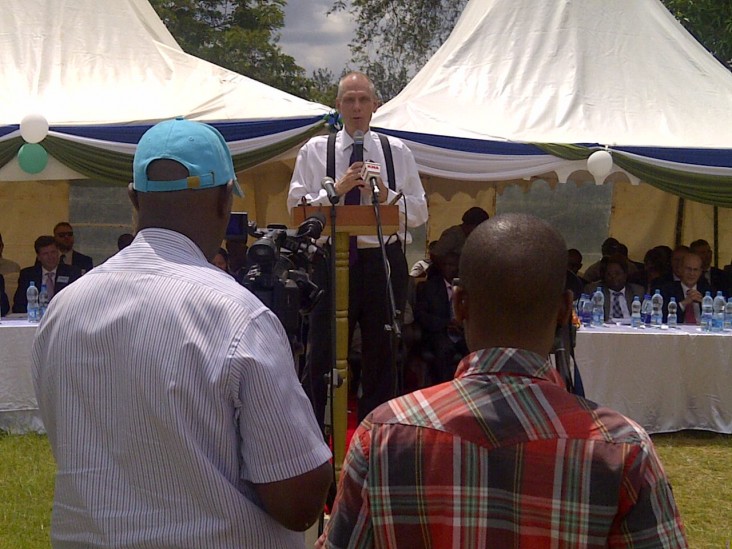
-As prepared-
Hamjambo mabibi na mabwana. Good afternoon and thank you for inviting me to launch this important project with you. Today we celebrate another achievement that will bring water and sanitation to more Kenyans, and that is truly something to celebrate.
In a recent analysis the citizens of Embu reported that they spend an average of 1,200 shillings per month for water. That's about 10 shillings per 20-liter jerry can. Besides the expense, they reported the water quality is unknown. Now, with the Embu Water and Sewerage Company, or EWASCO, pipeline distribution project's new water connection, the average cost should be closer to 1 shilling per 20-liter jerry can. A drop in price from 10 shillings to 1 per jerry can means more money for food, education, and savings. This project means high-quality water at a lower price for 75,000 people.
The EWASCO project model transforms the water and sanitation sector with private financing. It offers demand-driven, sustainable, and commercially-viable investments for development. As a result, low-cost services are brought to new urban settlements.
This model can be used in virtually every county in Kenya.
Last month the U.S. Agency for International Development participated in the commissioning of a Nyamasaria water project in Kisumu County that brought clean, affordable water to 16,000 residents. Like here, the projected rested on a private-public partnership, and technical assistance and innovative financing by USAID. I cannot overstate the value of private-public partnerships. Customers, utilities, and financial institutions all win here.
This project is the first Aid on Delivery grant from the Water Services Trust Fund and the first loan to the water utility sector from the Housing Finance Cooperation of Kenya. It is also the largest loan ever from a commercial bank to a water utility in Kenya. As such it marks a major expansion of Housing Finance's portfolio and an historical investment in Kenya’s future.
I would like to take this opportunity to recognize and thank the other development partners here – the Water Services Trust Fund, the German government, the Embu County government, Members of Parliament and the Senate, and local leaders - for their leadership and contributions to help develop a Kenya-led model for effective water service that can lead Kenya.
Lack of access to safe water and sanitation services has direct health implications. Globally, more than 800,000 children die from diarrhea every year. Most of these deaths can be prevented through access to safe drinking water, adequate sanitation, and good hygiene. In Kenya, approximately 18 million people still do not have access to drinking water. I applaud the progress the Government of Kenya is making toward its constitutional provision defining water as a basic right. The United States is committed to helping Kenya improve water delivery to citizens at the local level. We have been partners for 50 years, and look forward to continuing our important work together on water and sanitation projects and on dozens of other issues.
The United States Government remains a committed partner to helping Kenya achieve its Millennium Development Goals on water and sanitation. We will continue to align our support with the Government of Kenya water sector policies and plans, and we pledge our continued support to helping Kenya achieve its ultimate goal of universal access to water and sanitation.
Asanteni sana. Thank you
Related Speeches
- 6th Mara Day Celebration - Remarks by Brad Arsenault, Deputy Director for East Africa and Operations, Environment Office, USAID Kenya and East Africa
- Signing of a Memorandum of Understanding between Power Africa and the Nile Basin Initiative - Remarks by USAID Kenya and East Africa Deputy Mission Director Dr. Tina Dooley-Jones







Comment
Make a general inquiry or suggest an improvement.